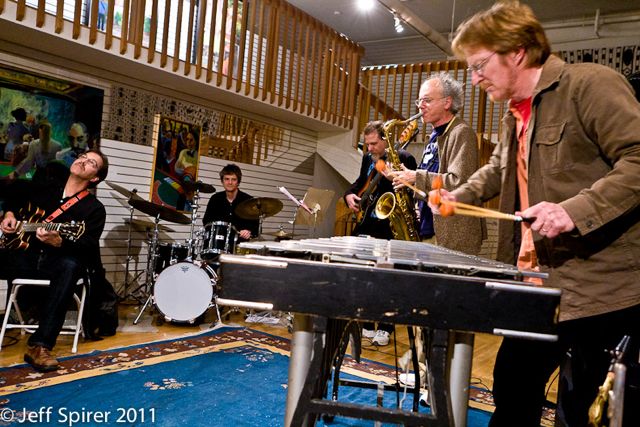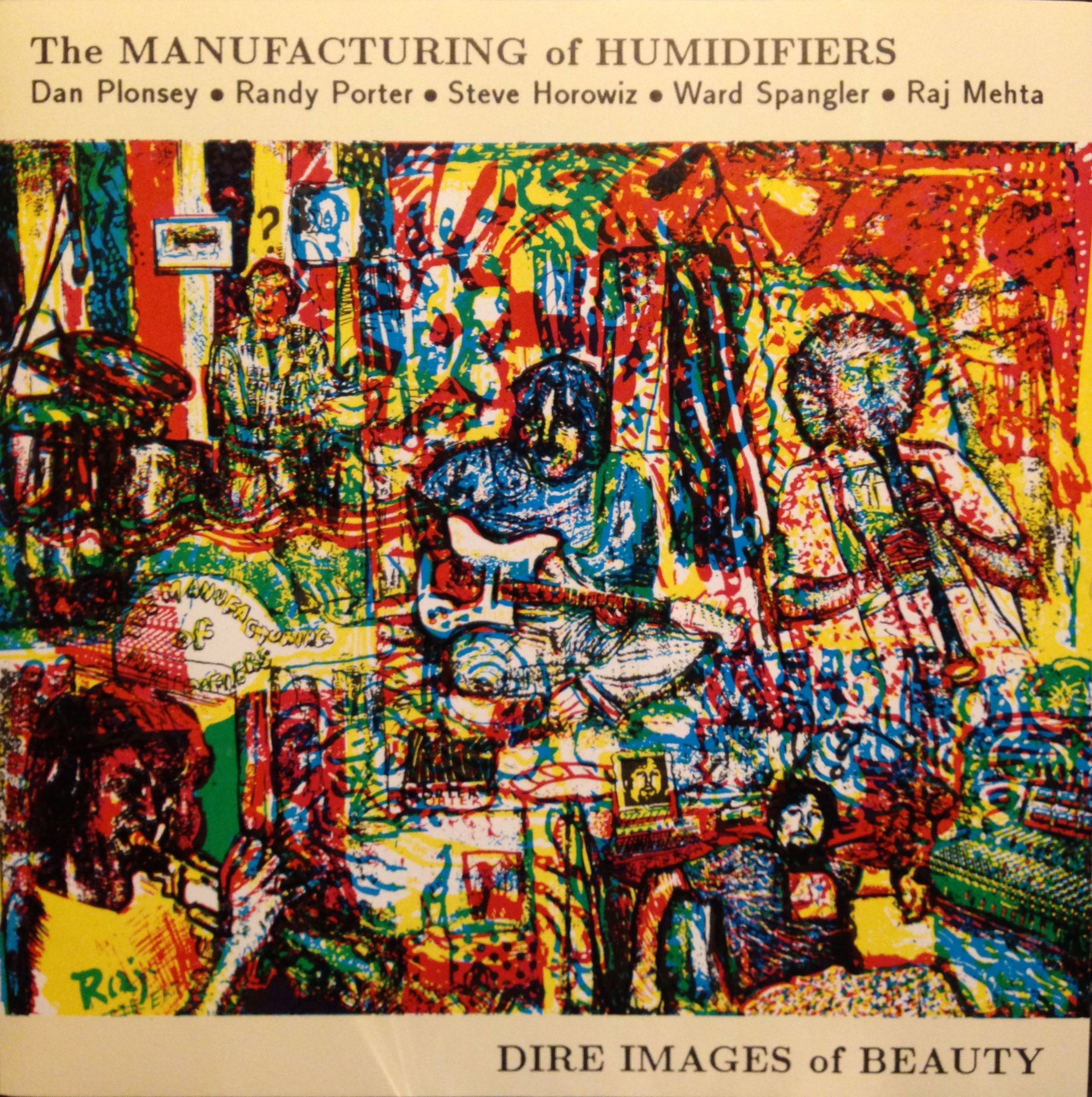



|
The Manufacturing of Humidifiers didn't set out to be iconoclasts.
Nor do they think themselves as excessively curmudgeonly.
"It's just that when we heard a dozen or so concerts of testosterone-driven noise being presented as the newest thing in creativity, we were kind of stunned. Musicians were acting like soldiers headed off to war-and this was happening just before `Desert Storm.'Dire Images of Beauty [the Man of Hu's second recording] was partially a reaction to the musical and political aggressiveness all around us. "We turned inward, as a group, and we worked out a way of making up music based upon the principles of counterpoint, and artistic and psychological reflection. We play with and against each other, tuning in to the compositional development which transcends our individual lines." They went down to Steve [Horowitz's] basement studio, and came out three days later with a mass of entirely improvised music of remarkable compositional coherence. They chose a dozen selections, with an eye for building an album-long narrative of contrasting moods and colors. "We were pleasantly surprised that so many people liked it. It's too low-key for the bloodlusting folks, and it's got too much noise for the acoustic purests." But the music nags at the you. It's like a bag of potato chips. Or like having an itch somewhere not on our bodies.
"Our music has a bit of native intelligence, about on the level of a truffle-hunting pig."It's an intelligence geared towards rooting around for simple beauties. It's light (but anti-lite). It's translucent, and it floats around, about two feet up off the ground. It's like hiking on the ridge trail at Tilden Park around dusk, and seeing a fox. Also, it's not exactly jazz (much as we love jazz) it's not "improvcore," and it's definitely not academic! There are humorous touches which people notice right away: some of the titles, and the occasional corny musical references. For instance, `Scalar Residuals' may be an unintentional extrapolation of `Doe, a Deer.' `Boots' Boots' reminded the band of Boots Randolph's cowboy-jazz. And there's some Bacharach. . . and circus band sounds. Then there's the hooting, and what-might-be-a-guitar through a nearly-dead distortion box. But it's not just gratuitous. We use humor as a means to lock in together, and it reminds us to keep it simple and direct." |

|
On their new recording, Dipping Into Color, the Manufacturing of Humidifiers chose to feature their compositions, and the result is a music that is both mystifying and exciting. Their compositions elude categorization without being contrived towards that end. Each piece has its own logic, a logic that is visible and grasp-able, and yet they're also totally crazy. They're like paintings that keep changing their colors: you have to chase after them. "We're calling this recording Dipping Into Color because all composers paint their own vision of the cosmos, and our vision is of a black and white world moving into a rainbow of color. So we dip and play in a few of the brighter hues and leave the rest to the listener's imagination. Again, like on Dire Images, the music is simple and deceptive, looking back to see that you're following deeper into the forest until we're all lost."
"We like to deliver the unexpected from within the realms of the vaguely (or even frighteningly) familiar. We wanted to make something that would sneak out and bite our listeners on their silky necks."
The Manufacturing of Humidifiers see their music as a very personal response to the absurd inner and outer worlds. Their approach is more surreptitious than confrontational. They hope that their music will find its way into each listeners' heart, and there give strength and courage to resist conformity.
"We're just hoping to continue to work with the magic we've got to make communicative music. We want to always be here as a reminder that there's absolutely nothing more fun and more serious than musical invention."
- Kenneth Holtzman, August 22, 1994
Dan Plonsey (saxophones, clarinets ) is from Cleveland, Ohio. He has a B.A. in math and music from Yale University, and an M.A. in composition from Mills College. His teachers include Anthony Braxton, Roscoe Mitchell, Martin Bresnick and David Lewin. Plonsey is an editor/writer/cartoonist for Freeway : "a journal of Creative Music," a system administrator for the UC Berkeley Astronomy Department, and the bass player in the art-pop band Dreamland . He has recorded CDs with Dreamland, John & Peter Hinds, Balinese gamelan Sekar Jaya , Ron Anderson, The Code , and Rastascan's (Y)earbook Compilation. Plonsey is a co-founder of two composers cooperatives: New Haven's Sheep's Clothing and Berkeley's Composers' Cafeteria . He counts Sun Ra, Charles Ives, and Ornette Coleman among his many musical influences.
Randy Porter (guitar ) is a second-generation Oaklander. He has a B.A. in music from UCLA, and has studied with guitar legend Dave Creamer. As the education director of the Berkeley Symphony, he has conducted the symphony in improvisations, and performances of music by nine-year-old composers. Porter recently released a CD of compositions and improvisations by his students (195 nine-eleven year-olds from the Oakland public school system) called Big Music, Little Musicians. This CD, along with his other innovations in music eductation have made him a subject of study in the local radio and print media. Porter is also a co-founder of The Composers' Cafeteria and the Improvised Music Association.
Ward Spangler (percussion ) was born in Berkeley, California. He studied percussion with Jerome Ness and Jack Van Geem among others, earning a B.A. and M.A. in music from Cal State Hayward. He is currently the principle percussionist for the Berkeley Symphony, and the Cabrillo music festival. Ward has played with Tom Buckner, Roscoe Mitchell and the Arch Ensemble; Dreamland, the Marin Symphony, and the new music ensemble Composers Inc. He has recorded with the Berkeley Symphony (Kent Nagano, conducting), the Arch Ensemble, and The Manufacturing of Humidifiers.